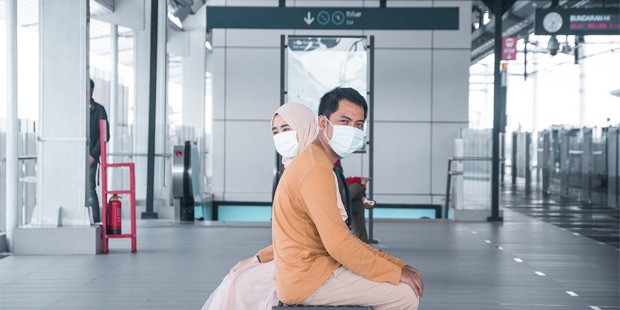5 Tips in Dealing with COVID Fatigue

COVID fatigue is real. Although nine months have passed since the pandemic broke out on a global scale, it shows no signs of slowing down. Health experts predict that a vaccine will be available by the first quarter of 2021, but it won’t be available for everyone. This leaves millions more to be stuck at home or at their respective locations for another few months. Even for the people who haven’t managed to stay healthy during the pandemic, staying indoors and having very limited interaction has taken both a physical and mental toll. If you are part of this group, check out these five tips to help you cope with COVID fatigue:
1. Stay Away from the News
Even on normal days, watching the news can be too stressful. From news revolving around robberies to natural disasters and even declining stock prices, there are news stories that can be too heavy for viewers. And with COVID-19 dominating headlines since early March, it's best to stay from reading or watching the news altogether. The Coronavirus and mental health are simply not a good match.

Although there are messages calling for unity in a time of a pandemic, real-life events have only indicated otherwise. Aside from a few countries that have managed to control the spread of the disease, most are in turmoil in creating a concrete plan to not only limit the spread but also limit the growing number of casualties. The healthcare crisis doesn’t even include the economic damage brought upon by the disease.
What you should do: Avoid news and headlines being reported by major media companies. Additionally, limit your social media usage by blocking anything that pertains to COVID-19. On the other hand, make sure to keep tabs on the happenings in your area or city as the local government may have implemented covid-19 protocol relating to safety and security.
2. Stick to a Routine
Nothing can be more stressful than dwelling on something for a very long time. With this, mental health can deteriorate very fast which only leads to more problems in the future. That is why sticking to a routine from Mondays to Sundays is essential not only to get your mind off from the current situation but also help you gain new skills and/or rediscover lost hobbies.
What you should do: Plan out your schedule for the entire week. If you’re working five or six days, continue that schedule and strictly focus on your work responsibilities. After working, spend time with family or your current companions and do some stuff that is enjoyable for everyone. You can also start a new hobby or do some activities that you consider enjoyable. If unemployed and looking for work, focus your time and energy by improving your CV as well as developing new skills that you think may help you land a job.
3. Cut Out Negative Coping Tendencies
Coping a stressful situation with unhealthy habits such as overdrinking, taking recreational drugs, or hitting another person doesn’t only affect yourself but also your family and friends. With the pandemic likely to carry over until the next year, recovering from possible mental health issues through the cutting out of negative coping tendencies should become a priority.
This is where having a routine can be very beneficial for your overall well-being. Overcoming negative tendencies can’t be achieved overnight. This is why having a daily routine as well as the right attitude goes a long way in building a better version of yourself even after COVID-19 has long been eradicated.
What you should do: List down all your negative coping tendencies and write down corresponding actions on how you intend to overcome them. If you can integrate that tendency into your daily routine, the better (for example, if your coping technique is “playing video games while working” change it to “play games only after work”, etc.). You can also create a timeline but always take note to never rush especially if you’ve been using the coping technique for a long time.
4. Exercise and Eat Right
COVID awareness also pertains to living a healthy lifestyle. There’s a reason why the World Health Organization has recommended more consumption of fruits and vegetables during these times. Although nothing can be classified as a “miracle food” to stop the Coronavirus, eating right can help the body fight and recover from infections at a much faster rate.
The same goes for regular exercise. Some exercise benefits include increased brain function, monitored weight loss, reduced anxiety and depression, better sleep, and improved heart health, among many others. With most gyms and exercise facilities closed these days, exercising at home has become the norm.

What you should do: Find a workout plan online and implement it in your daily routine. If you haven’t done a lot of exercising in the past, start slow and gradually work your way to build more stamina and strength. As for having a healthy diet, limit intake for fatty foods or foods high in fat and cholesterol, and replace it with a diet rich in protein and Vitamin C. If healthy options are not readily available in your area, order online or get in touch with local suppliers. If you do need to go outside to purchase food, practice social distancing at all times.
5. Always Ask for Help
Drifting away from family and friends is never a good idea especially with this current situation. People need all the support they can get, and you should too especially if you are feeling anxious or lonely. Thanks to technology, the burden of being away from loved ones are decreased through regular chats and video calls. But if mental health is compromised and you feel like going to a doctor can help you ease the stress, never hesitate to book an online appointment.

What you should do: The importance of various messaging platforms such as Facebook Messenger, Skype, and Zoom have only increased ten-fold. Since these platforms are generally free, you can use them to contact your loved ones every single day. On the other hand, if you are seeking professional help, take time to find licensed practitioners in your area and schedule an appointment. The road to mental illness recovery can be tough, but with the right practitioner and the right support group, you’ll be back at your best in no time.
The things listed above are just a few ways to prevent COVID fatigue. Even if you can’t control the spread, you can always control your mental approach in making sure the pandemic doesn’t take over your mental health.









